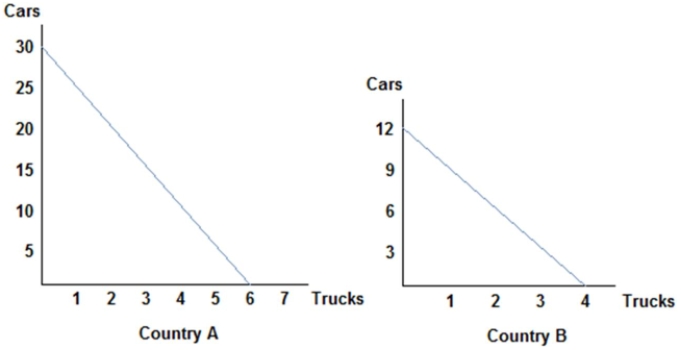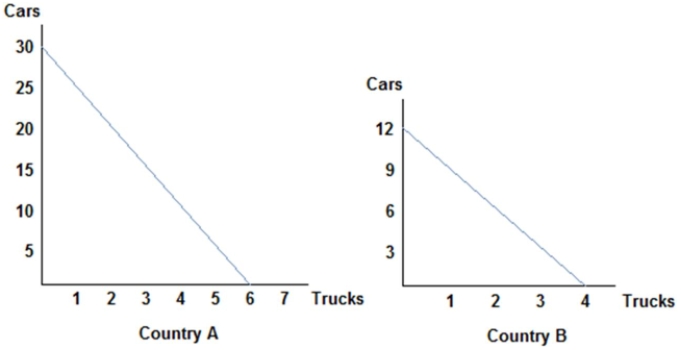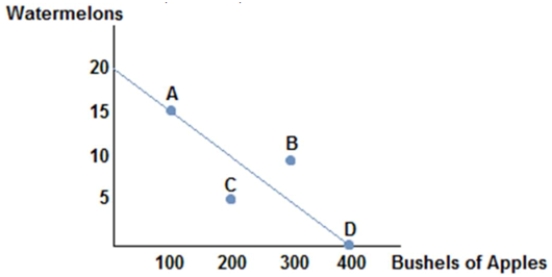A) comparative; tablets
B) absolute; tablets
C) comparative; iPods
D) absolute; iPods
F) A) and B)
Correct Answer

verified
Correct Answer
verified
Multiple Choice
Suppose that a worker in Country A can make either 10 iPods or 5 tablets each year. Country A has 100 workers. Suppose a worker in Country B can make either 2 iPods or 10 tablets each year. Country B has 200 workers. A bundle of goods that Country A could potentially make would be:
A) (1,000 iPods, 500 tablets) .
B) (500 iPods, 500 tablets) .
C) (500 iPods, 250 tablets) .
D) (750 iPods, 150 tablets) .
F) A) and D)
Correct Answer

verified
Correct Answer
verified
Multiple Choice
When a producer has an absolute advantage at producing a good, it means the producer:
A) can produce more of that good than others with the same amount of resources.
B) has the ability to produce a good or service at a lower opportunity cost than others.
C) has no reason to trade with others.
D) is less efficient than other producers.
F) A) and C)
Correct Answer

verified
Correct Answer
verified
Multiple Choice
Suppose that a worker in Country A can make either 25 bananas or 5 tomatoes each year. Country A has 200 workers. Suppose a worker in Country B can make either 18 bananas or 6 tomatoes each year. Country B has 400 workers. The workers in Country A should specialize in __________________ because they possess the ___________________ in the production of that good.
A) bananas; comparative advantage
B) tomatoes; comparative advantage
C) bananas; absolute advantage
D) tomatoes; absolute advantage
F) All of the above
Correct Answer

verified
Correct Answer
verified
Multiple Choice
 Refer to the figure shown, which represents the production possibilities frontiers for Countries A and B After examining each country's production possibilities curve, it is clear that:
Refer to the figure shown, which represents the production possibilities frontiers for Countries A and B After examining each country's production possibilities curve, it is clear that:
A) neither country will benefit from trade.
B) both countries can benefit from trade because absolute advantage exists.
C) both countries could benefit from trade because comparative advantage exists.
D) only Country A will benefit from trade.
F) B) and C)
Correct Answer

verified
Correct Answer
verified
Multiple Choice
 Refer to the figure shown, which represents the production possibilities frontiers for Countries A and B Considering both country's production possibilities frontiers, we can conclude that Country B will specialize in:
Refer to the figure shown, which represents the production possibilities frontiers for Countries A and B Considering both country's production possibilities frontiers, we can conclude that Country B will specialize in:
A) trucks, and be willing to accept no fewer than 3 cars for each truck.
B) cars, and be willing to give no more than 3 cars for each truck.
C) trucks, and be willing to accept no more than 3 cars for each truck.
D) cars, and be willing to give no fewer than 3 cars for each truck.
F) A) and C)
Correct Answer

verified
Correct Answer
verified
Multiple Choice
When a producer has the ability to produce a good or service at a lower opportunity cost than others, economists say the producer:
A) has an absolute advantage at producing that good.
B) has a comparative advantage at producing that good.
C) has no reason to trade with others.
D) is efficient in production.
F) A) and B)
Correct Answer

verified
Correct Answer
verified
Multiple Choice
Tom and Jerry have two tasks to do all day: make dishes and build fences. If Tom spends all day making dishes, he will have make 16 dishes. If he instead devotes his day to building fences, Tom will build 4 fences. If Jerry spends his day making dishes, he will make 14 dishes; if he spends the day building fences, he will build 7 fences. If Tom divides his time evenly between activities and acts efficiently, he will produce:
A) 16 dishes and 4 fences.
B) 12 dishes and 3 fences.
C) 8 dishes and 2 fences.
D) 4 dishes and 3 fences.
F) B) and C)
Correct Answer

verified
Correct Answer
verified
Multiple Choice
If Spain is capable of producing either tapas or soccer balls or some combination of those two products, then Spain should:
A) produce the good it has an absolute advantage in producing.
B) produce the good it has a comparative advantage in producing.
C) remain self-sufficient if it can produce both efficiently.
D) trade only if it possesses the absolute advantage in the production of both goods.
F) A) and B)
Correct Answer

verified
Correct Answer
verified
Multiple Choice
Suppose that a worker in Country A can make either 25 bananas or 5 tomatoes each year. Country A has 200 workers. Suppose a worker in Country B can make either 18 bananas or 6 tomatoes each year. Country B has 400 workers. Suppose Country A specializes in bananas, and Country B specializes in tomatoes. The limits to the terms of trade that Country A would find acceptable are Country A will give no:
A) more than 5 bananas for each tomato.
B) less than 5 bananas for each tomato.
C) more than 1 tomato for every 5 bananas.
D) less than 1 tomato for every 5 bananas.
F) A) and D)
Correct Answer

verified
Correct Answer
verified
Multiple Choice
People will choose to specialize and trade if they can acquire the goods they want:
A) at a lower cost than it would cost them to make the goods themselves.
B) at a higher cost than it would cost them to make the goods themselves.
C) from someone who is willing to trade with them.
D) from a capitalistic system of exchange.
F) B) and D)
Correct Answer

verified
Correct Answer
verified
Multiple Choice
Which of the following statements about trade is true?
A) Trade involves a winner and a loser.
B) Trade often hurts both parties in the long run.
C) Trade is a zero sum proposition.
D) Trade can benefit both parties.
F) C) and D)
Correct Answer

verified
Correct Answer
verified
Multiple Choice
Assume that the opportunity cost for Germany to produce a jet is 50 cars. If Germany is producing on its production Possibility Frontier, some possible combinations of output for Germany could be:
A) (1,000 jets, 5,000 cars) and (900 jets, 10,000 cars) .
B) (1,000 jets, 5,000 cars) and (900 jets, 15,000 cars) .
C) (2,500 jets, 2,000 cars) and (2,300 jets, 20,000 cars) .
D) (2,500 jets, 2,000 cars) and (2,300 jets, 3,000 cars) .
F) All of the above
Correct Answer

verified
Correct Answer
verified
Multiple Choice
Suppose that a worker in Country A can make either 25 bananas or 5 tomatoes each year. Country A has 200 workers. Suppose a worker in Country B can make either 18 bananas or 6 tomatoes each year. Country B has 400 workers. The opportunity cost of one tomato in Country A is:
A) 100 bananas.
B) 20 bananas.
C) 5 bananas.
D) 4 bananas.
F) A) and D)
Correct Answer

verified
Correct Answer
verified
Multiple Choice
Suppose England has a comparative advantage over the United States in producing tea. If this is true, then:
A) England should produce more tea than it wants and sell the rest to the United States.
B) England should produce a small amount of tea and buy the rest of the tea it wants from the United States.
C) England should not produce tea, and should instead buy it all from the United States.
D) the United States has nothing to gain from buying tea from England.
F) C) and D)
Correct Answer

verified
Correct Answer
verified
Multiple Choice
Suppose an American worker can make 100 chairs or catch 1000 fish per day. On the other hand, a Chilean worker can produce 40 chairs or catch 400 fish per day. The United States possesses a(n) _______________ advantage in chair production, but not a(n) ______________ advantage in fish production.
A) absolute; comparative
B) comparative; absolute
C) absolute; absolute
D) comparative; comparative
F) A) and D)
Correct Answer

verified
Correct Answer
verified
Multiple Choice
Suppose an American worker can make 20 pairs of shoes or grow 100 apples per day. On the other hand, a Canadian worker can produce 10 pairs of shoes or grow 20 apples per day. Which of the following statements is true? The United States has an absolute advantage:
A) and a comparative advantage in the production of shoes.
B) and a comparative advantage in the production of apples.
C) in the production of both goods and a comparative advantage in the production of neither good.
D) in the production of both goods and a comparative advantage in the production of both goods.
F) None of the above
Correct Answer

verified
Correct Answer
verified
Multiple Choice
 Consider the production possibilities frontier displayed in the figure shown. The opportunity cost of one watermelon is:
Consider the production possibilities frontier displayed in the figure shown. The opportunity cost of one watermelon is:
A) 10 bushels of apples.
B) 20 bushels of apples.
C) 30 bushels of apples.
D) 40 bushels of apples.
F) A) and D)
Correct Answer

verified
Correct Answer
verified
Multiple Choice
 Consider the production possibilities frontier displayed in the figure shown. If this society chooses to produce 200 bushels of apples it can produce no more than:
Consider the production possibilities frontier displayed in the figure shown. If this society chooses to produce 200 bushels of apples it can produce no more than:
A) 20 watermelons.
B) 15 watermelons.
C) 10 watermelons.
D) 5 watermelons.
F) A) and C)
Correct Answer

verified
Correct Answer
verified
Multiple Choice
When nations trade, it:
A) only benefits the stronger nation.
B) only benefits the weaker nation.
C) can benefit all nations involved.
D) can only benefit one nation, but we cannot say which nation without more information.
F) A) and B)
Correct Answer

verified
Correct Answer
verified
Showing 101 - 120 of 136
Related Exams